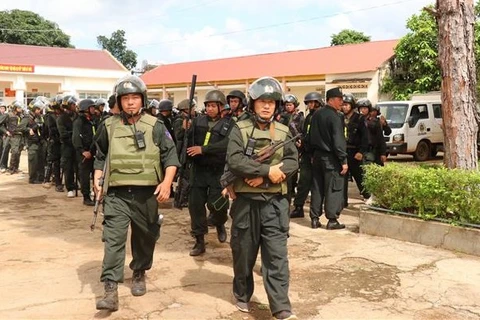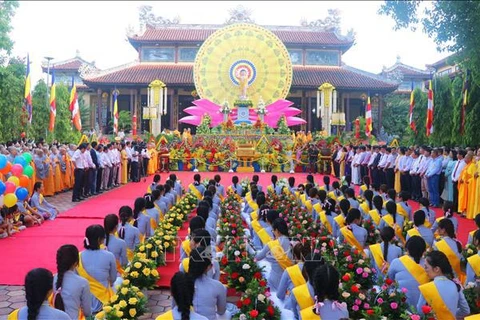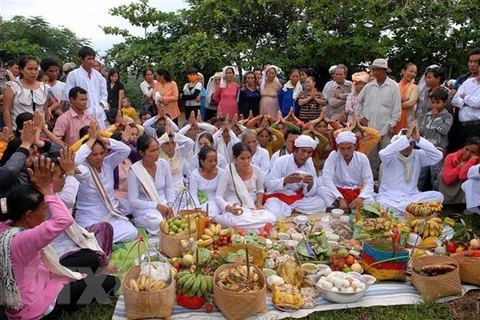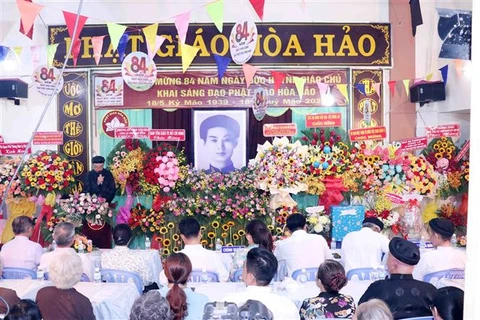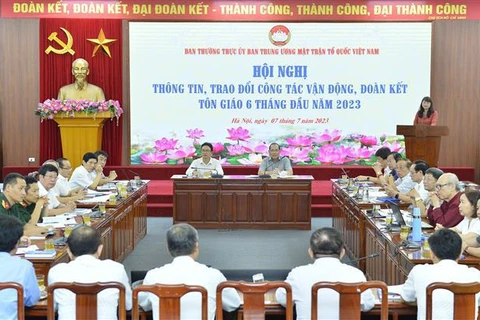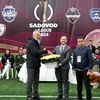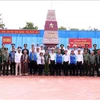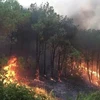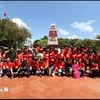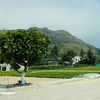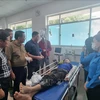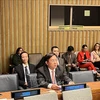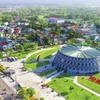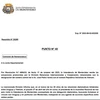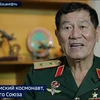 Police of Yen Bai province distribute documents at a law dissemination conference to improve local residents' awareness of illegal religious groups. (Photo: VNA)
Police of Yen Bai province distribute documents at a law dissemination conference to improve local residents' awareness of illegal religious groups. (Photo: VNA) These organisations have built up forces with the aim of sabotaging the Party and State, establishing separate states, and driving a wedge into the people’s solidarity.
“An dien cuu roi” (literally translated as “grace of salvation”), also called “An dien doi doi” (eternal grace) or “Tin lanh Viet Nam truyen giao” (Vietnam evangelical mission), originated outside Vietnam. Its doctrine is based on the Bible like other Protestant organisations but features wrongful interpretation of the Bible and encourages extreme and law-violating lifestyles, posing risks of triggering a divide among the community and followers of official Protestant sects. Leaders of this group have taken advantage of charity activities, vocational training, travel tours, meetings, and workshops abroad to induce young people to follow.
In the northern mountainous province of Yen Bai, more than 90 households with 536 Mong ethnic people in the districts of Mu Cang Chai, Van Chan, Tram Tau, Tran Yen, and Van Yen have followed “An dien cuu roi”.
Meanwhile, six households with 40 people also from the Mong ethnic minority in Tram Tau and Van Chan districts have taken part in “Gie sua”, an organisation founded by David Her, a self-proclaimed pastor in California of the US, in 2015. His real name is Ho Cha Sung, about 50 years old, a Mong people from Phonsavan district of the Lao province of Xieng Khouang.
This organisation often criticizes official religions and says Jesus (pronounced “Giesu” in Vietnamese) is a wrong name Roman rulers in the past intentionally wrote to serve their domination plot. It insists that “Giesu” (Catholicism and Protestantism) is not the religion of Mong people, but “Gie sua” is. It also incites the ethnic minority to fight and found a separate state.
More than 100 households with nearly 750 people in 31 hamlets, villages, and residential groups of 20 communes, wards, and townships in eight district-level localities are following 11 illegal religious organisations. Most of them are Mong people residing in remote and disadvantaged areas, according to the Yen Bai provincial Department of Public Security.
 Officers from the internal security division of the Yen Bai Department of Public Security often visit villages of Mong people to popularise information about illegal religious groups. (Photo: VNA)
Officers from the internal security division of the Yen Bai Department of Public Security often visit villages of Mong people to popularise information about illegal religious groups. (Photo: VNA) To prevent illegal activities of “Gie sua” and “An dien cuu roi”, officers of the internal security division of the Yen Bai Department of Public Security have frequented villages of Mong people to disseminate information helping locals realise the signs and nature of illegal religious groups and the harm of following evil religions. Thanks to that, many who used to be influenced by those organisations have become more open, complied with the Party and State’s guidelines, policies and laws, actively engaged in economic development, and not abandoned their families to follow ill-intentioned persons.
Localities in the province have also frequently combined awareness-raising communications with village meetings or Party cells’ activities, and brought into play the role of reputable persons of communities to strengthen solidarity.
Besides, local Party committees, authorities, and public security forces have also proactively grasped the situation of their localities, stepped up the “All people defend the Fatherland’s security” campaign, and held collective and individual meetings to help locals realise the nature of such illegal organisations as “Gie sua” and “An dien cuu roi”.
As a results, five households with 32 people have left “Gie sua” while nearly 50 households with more than 250 members pledged to quit “An dien cuu roi” to return to their ethnic group’s traditional belief or the religious organisations recognised by the State.
The measures taken by Yen Bai authorities have helped not only raise public awareness of law adherence but also guarantee local political security and social order and safety./.
VNA
